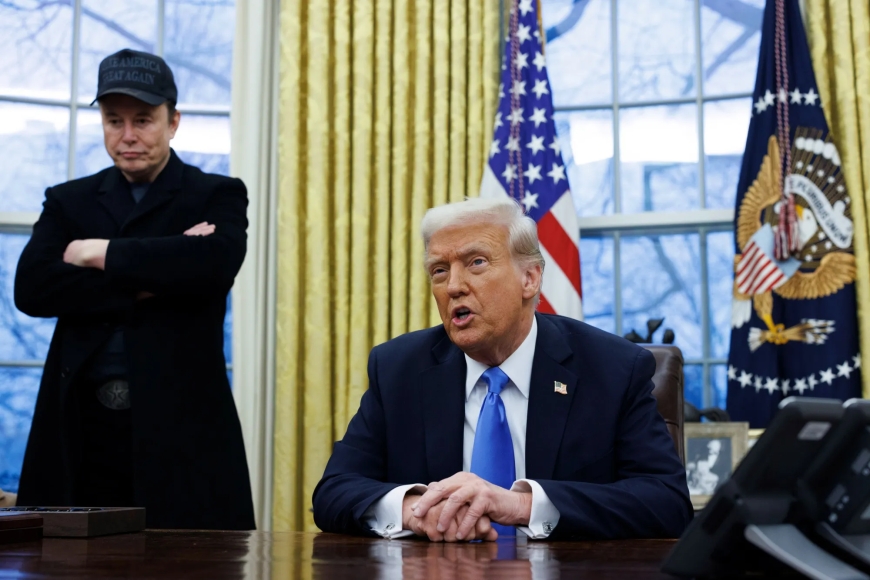Elon Musk, Donald Trump, and the Unchecked Power of the Government Efficiency Office
In yet another controversial turn in American politics, a coalition of 14 state attorneys general has filed a lawsuit against former President Donald Trump and billionaire Elon Musk, alleging that the extraordinary powers granted to Musk through the so-called Department of Government Efficiency (DOGE) are unconstitutional. The lawsuit, spearheaded by Democratic attorneys general from Arizona, Michigan, Rhode Island, and several other states, highlights deep concerns over the unchecked authority Musk now wields within the federal government.

In yet another controversial turn in American politics, a coalition of 14 state attorneys general has filed a lawsuit against former President Donald Trump and billionaire Elon Musk, alleging that the extraordinary powers granted to Musk through the so-called Department of Government Efficiency (DOGE) are unconstitutional. The lawsuit, spearheaded by Democratic attorneys general from Arizona, Michigan, Rhode Island, and several other states, highlights deep concerns over the unchecked authority Musk now wields within the federal government.
At the heart of the issue is the Trump administration’s decision to create DOGE, an unofficial government entity designed to eliminate wasteful federal spending and streamline bureaucracy. However, critics argue that the department has become a vehicle for Musk to exert broad and largely unregulated influence over government operations, sidestepping the traditional checks and balances that define American governance.
The attorneys general argue that Trump violated the Constitution’s Appointments Clause by establishing DOGE without Congressional approval and allowing Musk to make sweeping changes without Senate oversight. The lawsuit seeks to block Musk from making unilateral decisions on government funding, federal contracts, and personnel appointments—actions that typically require rigorous legislative and judicial scrutiny.
The White House, unsurprisingly, has dismissed the lawsuit as a politically motivated attack. Press Secretary Caroline Levitt characterized the legal challenge as "an extension of President Trump’s weaponization of justice," insisting that the administration would prevail in court. This rhetoric is consistent with Trump’s broader strategy of framing legal challenges against him as partisan witch hunts, a tactic that has proven effective in rallying his base but does little to address the fundamental constitutional concerns at play.
This lawsuit is not an isolated case. Previously, a group of federal employees filed a separate legal challenge, fearing that DOGE could grant Musk access to sensitive government data and pave the way for mass firings within federal agencies. The plaintiffs argued that such moves would not only violate due process but also undermine the integrity of the civil service.
Beyond the legal arguments, this situation raises serious questions about the growing influence of unelected billionaires in government affairs. Musk, who already holds enormous sway in the private sector through Tesla, SpaceX, and social media platform X (formerly Twitter), now appears to have an unprecedented role in shaping federal policy. His leadership of DOGE has been framed as a cost-cutting measure, but critics argue it is simply a means for Trump to further consolidate power and dismantle regulatory agencies that stand in the way of his political agenda.
There’s also the issue of transparency—or lack thereof. The creation of DOGE was not subject to the usual congressional oversight, and its exact functions remain murky. How much authority does Musk actually have? What mechanisms exist to hold him accountable? Who is overseeing his decisions? These are critical questions that remain unanswered.
The potential implications extend far beyond the immediate legal battles. If DOGE is allowed to operate without constraint, it sets a dangerous precedent for future administrations. The concentration of executive power in the hands of a single unelected individual—especially one with deep financial interests in industries that intersect with government policy—undermines the principles of democracy and accountability.
While Trump and his allies may dismiss these concerns as political posturing, the stakes are too high to ignore. The United States was founded on the principle that no one is above the law, yet the creation of DOGE suggests that power can be granted to private individuals without the scrutiny of the legislative branch. If the courts fail to rein in this overreach, it could open the door for further erosion of the country’s democratic safeguards.
At the end of the day, this lawsuit is not just about Musk or Trump—it’s about the fundamental structure of American governance. The question is whether the courts will uphold the Constitution or allow a new precedent where billionaires can be handed unchecked authority over the country’s administrative state. If history has taught us anything, it’s that concentrated power, left unchecked, rarely ends well.













































